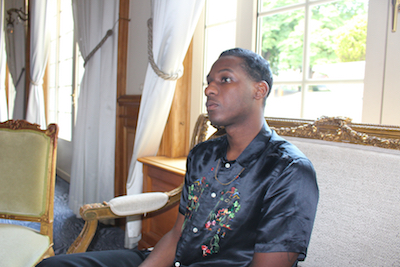Leon Bridges: 'We are pressured into making political music'

BUILDING BRIDGES: American soul singer Leon Bridges is creating modern music with historical influences
AFTER SCALING the golden stairs of the Montreux Palace, I finally got to meet the man of the hour: Leon Bridges. The Grammy-nominated artist sat in a large ballroom alone before his show at the Montreux Jazz Festival, in Switzerland. At first, the Fort Worth native’s beguiling charm represented a person well beyond his 28 years, but it soon broke down when he spoke about his first experience at Montreux. “The last time I was here was my birthday!” he said beaming from cheek to cheek. Bridges playfully added that he also got to meet Quincy Jones at the jam session, too, all the while sipping on bourbon and having what seemed to be an unforgettable night.
When it comes to music, though, Bridges, whose real name is Todd Michael Bridges, is dead serious and devoutly dedicated to his craft. He cites Usher as an inspiration and wants to be in the same conversation as the Khalid’s of the industry. Playing alongside the UK songstress Mahalia and his musical brother Gary Clark Jr for the Montreux gig reveals how far he has already come. His humility shines through the star appeal. During our conversation he thanked Clark Jr for passing on wisdom. “I met him early on in my career. He's always been [a] what-you-see-is-what-you-get, genuine kind of person. It's really nice when you’re maneuvering through this music industry to find guys like that.”
Authenticity is important to Bridges. It’s clear that he has an acute ear and a vast range of musical influences, something that he finds lands him in conflict, at times, with some of his generation’s knowledge – or lack thereof – of historical black music. He referred to the 2016 Roots Picnic festival, an event where he felt he was rebuked as a sideshow by his black peers. “I think that I would say specifically in African-American culture we just aren’t taught to dig deeper into music history and so in the beginning I was doing the classic sixties thing and it was viewed as ‘oh that’s white’ or you know, or whatever…”
The most confusing thing about the apparent rebuke is that an artist like Bridges is carrying black culture forward by embracing both the future and the past, which is deftly shown on his chart-topping album Good Thing. Bridges takes a musical leap here and elsewhere recently collaborating with Dej Loaf on the politically-charged Liberated and even with the dance duo Odesza’s Across the Room. All of this in his pursuit to be one of the greats, “I’m a person with ambition. I want to be in the same conversation as the greats but viewed at like: “Oh, he’s still a little different.’”

OLD SOUL: 'We just aren’t taught to dig deeper into music history,' said Bridges (Image: Chris Clyde Green)
Bridges’ desire to stand out from the crowd yet maintain relevance brought his talents to the attention of Ricky Reed and Nate Mercereau, who helped guide his music down a less-traditional path – both vocally and sonically. Musically, this was great move, however, one thing that Good Thing lacks is a political message, which is surprising considering the political climate in the light of Trump and Brexit and their impact on black people in the US and the UK.
Bridges believes “all music is political...as an artist and specifically as a black man we are pressured into making political music. I look at it as, like, whenever it makes sense within a song, I’ll write politically”. One such time seems to be in Dej Loaf’s Liberated where the lyrics talk about being proud of one’s brown skin and women’s rights.
“It’s great to give people hope,” said Bridges as he adjusted his suede loafers and peered to the ground thoughtfully.
It seems his lyrics can be deep at times but right now he prefers to focus on relatable ideas, like true love in Beyond or the importance of family-ties in the Townes Van Zandt-inspired Georgia to Texas. “I always look at what is the effect of putting politics in a song. Is it more to please people so they think, like, ‘Oh he's political, good.”’
The American soul singer added: “If I'm going to do something no one is going to know about it; being a servant and giving back, it’s not going to be put in a song, it’s not going to be put on social media. It’s going to be real.”
The road to stardom hasn’t been easy for Bridges and his transition from sixties crooner to the modern-day mix of Good Thing created some tension in his camp and with diehard fans. “I went through the emotions of wanting to please my fans, give them something they wanted, but also continue to stay progressive and move forward. As I was making this album I was in a place where I was saying: ‘I think I dig this, but is it too far?’ I was going through all that in the process.”
The experiment seems to have paid off with the album reaching number on the R’n’B billboard charts, which in turn has brought him other projects such as a role in Damien Chazelle’s The First Man. Bridges has certainly come a long way after being discovered at a local open mic night. He wants to make his music more experimental, more jazzy and remember he is not just doing this for himself, he is doing it “for the culture”.
Montreux Jazz festival takes place every year in early July in Montreux, Switzerland.
Read every story in our hardcopy newspaper for free by downloading the app.






